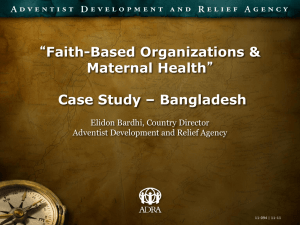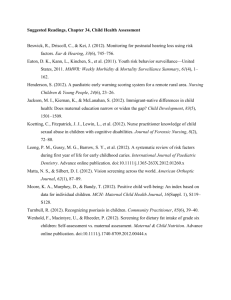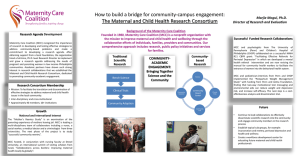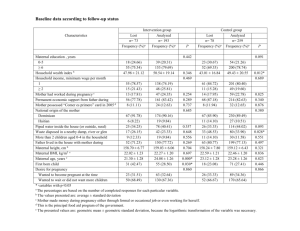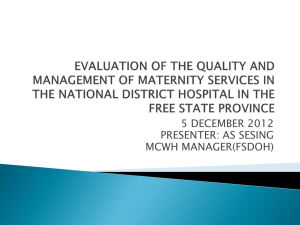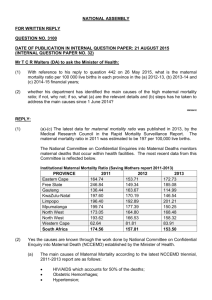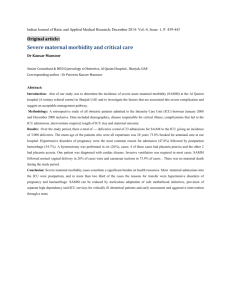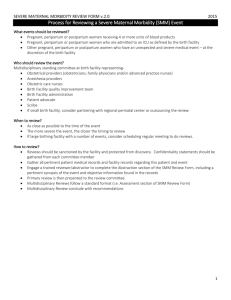Maternity Specialist - Health Quality & Safety Commission
advertisement
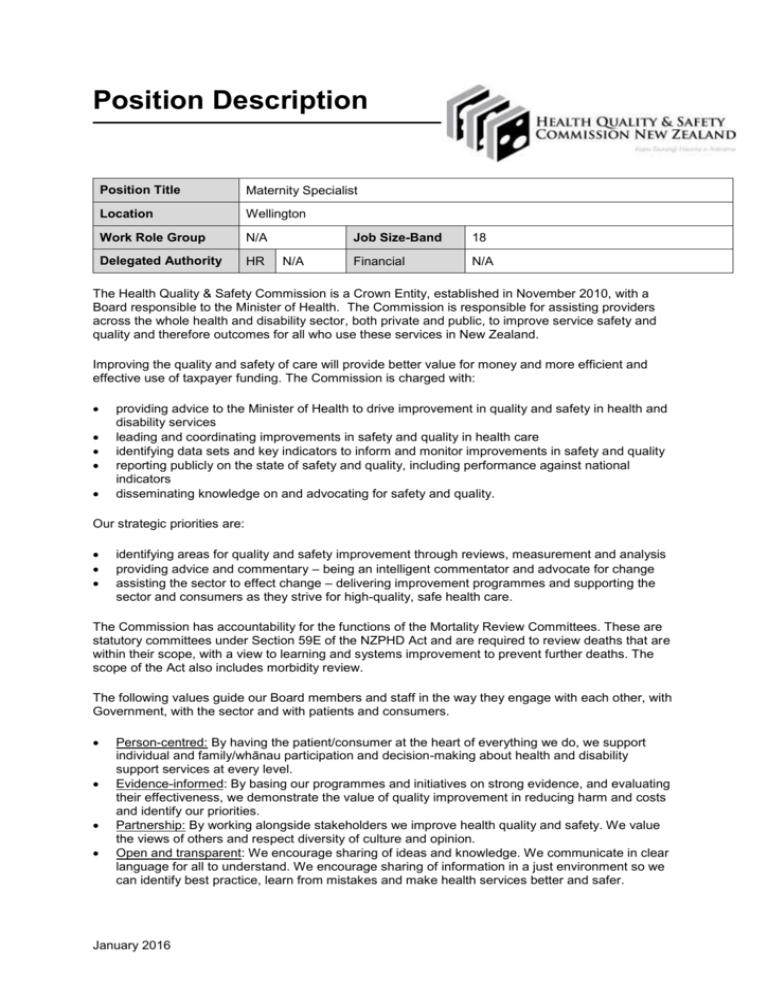
Position Description Position Title Maternity Specialist Location Wellington Work Role Group N/A Delegated Authority HR N/A Job Size-Band 18 Financial N/A The Health Quality & Safety Commission is a Crown Entity, established in November 2010, with a Board responsible to the Minister of Health. The Commission is responsible for assisting providers across the whole health and disability sector, both private and public, to improve service safety and quality and therefore outcomes for all who use these services in New Zealand. Improving the quality and safety of care will provide better value for money and more efficient and effective use of taxpayer funding. The Commission is charged with: providing advice to the Minister of Health to drive improvement in quality and safety in health and disability services leading and coordinating improvements in safety and quality in health care identifying data sets and key indicators to inform and monitor improvements in safety and quality reporting publicly on the state of safety and quality, including performance against national indicators disseminating knowledge on and advocating for safety and quality. Our strategic priorities are: identifying areas for quality and safety improvement through reviews, measurement and analysis providing advice and commentary – being an intelligent commentator and advocate for change assisting the sector to effect change – delivering improvement programmes and supporting the sector and consumers as they strive for high-quality, safe health care. The Commission has accountability for the functions of the Mortality Review Committees. These are statutory committees under Section 59E of the NZPHD Act and are required to review deaths that are within their scope, with a view to learning and systems improvement to prevent further deaths. The scope of the Act also includes morbidity review. The following values guide our Board members and staff in the way they engage with each other, with Government, with the sector and with patients and consumers. Person-centred: By having the patient/consumer at the heart of everything we do, we support individual and family/whānau participation and decision-making about health and disability support services at every level. Evidence-informed: By basing our programmes and initiatives on strong evidence, and evaluating their effectiveness, we demonstrate the value of quality improvement in reducing harm and costs and identify our priorities. Partnership: By working alongside stakeholders we improve health quality and safety. We value the views of others and respect diversity of culture and opinion. Open and transparent: We encourage sharing of ideas and knowledge. We communicate in clear language for all to understand. We encourage sharing of information in a just environment so we can identify best practice, learn from mistakes and make health services better and safer. January 2016 Leadership: By showing leadership, we set the direction for health quality and safety in New Zealand and encourage innovation and change to achieve our shared vision. We promote a number of generic principles, including the need to: increase patient involvement in their own care, and its quality use robust measurement and information to inform and encourage debate and identify key opportunities for improvement increase capability within the health and disability workforce and among consumers to make quality improvement ‘business as usual’ support and encourage respect and teamwork inform and mobilise the population to assist in preventing harm promote evidence-based practices and the sharing of good practice support and encourage good communication. Position purpose and responsibilities The position will primarily provide expert advice and review to the Commission’s maternal morbidity project under the auspices of the Perinatal and Maternal Mortality Review Committee and other Commission programmes relevant to the maternity sector. This role will work with maternal morbidity review panels and the wider maternity sector to identify areas of quality improvement in maternity. The position will primarily work with the Mortality Review Committee team, but maintaining and building maternal morbidly review across the sector will be important. The role will initially focus on maternal morbidity review processes and reporting, but will lead to developing quality improvement initiatives in maternity. The person in this position will have an in-depth knowledge of New Zealand’s maternity system, taking a holistic systems approach to improving quality and safety of the system. Key elements of the role involve: Overseeing collection of data from maternal morbidity reviews and works with data provider to generate reports about maternal morbidity Developing the review process for maternal morbidity cases, ensuring a robust methodology – consistent with current best practice Enhancing and developing prioritisation criteria to select cases for review Being the key clinical contact with maternal morbidity review panel members, overseeing the management of the review process Focusing on integration of maternal morbidity review within the wider context of the Perinatal and Maternal Mortality Review Committee and other maternity-related review and reporting processes of the Commission. Providing expert maternity advice to the work programme and wider Commission. Working with maternal morbidity review panels and the wider maternity sector to identify areas of quality improvement in maternity Facilitating maternity improvement initiatives in the sector, in liaison with Commission staff and technical and clinical specialists. January 2016 Key responsibilities and expectations These include but are not limited to: Key responsibilities Maternal morbidity review Performance expectations Supporting maternity quality improvement Relationship management January 2016 Develops and oversees the review process for maternal morbidity cases, ensuring a robust methodology Enhances and develops prioritisation criteria to select cases for review Oversees collection of data from reviews and works with data provider to generate reports about maternal morbidity Oversees data quality Key clinical contact with maternal morbidity review panel members, overseeing the management of the review process Focuses on integration of maternal morbidity review within the wider context of the Perinatal and Maternal Mortality Review Committee and other maternity-related review and reporting processes of the Commission. Provides expert maternity advice to immediate team and wider Commission. Works with maternal morbidity review panels and the wider maternity sector to identify areas of quality improvement in maternity Facilitate maternity improvement initiatives in the sector, in liaison with Commission staff and technical and clinical specialists Maintain up-to-date knowledge and understanding of best practice quality improvement and patient safety approaches Support specific programmes to use best practice quality improvement approaches, including being available on a day-to-day basis to provide quality improvement support and advice Use appropriate evidence-based improvement methodologies to design, guide and evaluate specific quality improvement and patient safety programmes for the maternity sector – and then support implementation of these programmes Ensure any measures used to evaluate programmes or projects are robust, easily understood and fit for purpose Proactively work to engage consumers in the Commission’s maternity improvement initiatives and in sector initiatives more generally Work with provider organisations to understand their specific quality improvement challenges and advise on appropriate approach/s to implementing change Build strong relationships with relevant Commission clinical leads and expert advisory groups, particularly the Perinatal and Maternal Mortality Review Committee and its sub-groups Initiate, develop and maintain close liaison and consultation with providers, academics, consumers, clinicians and others to ensure relevant and effective implementation of Commission maternity projects Promote and foster cooperation and collaboration between teams and organisations in the health and disability sector Build relationships with other Commission programmes and share knowledge and expertise across the programmes Team activities Cultural competency Prepare and provide briefings, papers and project reporting to management, governance, steering and advisory groups as required and provide input into ministerials, parliamentary questions, briefings and other requests for information Assist appropriate programme staff to develop material for communication with the sector Undertake other tasks as allocated by management Apply the principals of cultural safety to the projects being managed Display respect, sensitivity and cultural awareness in interpersonal relationships Acknowledge cultural differences by respecting spiritual beliefs, cultural practices and lifestyle choices Key relationships within the Commission General Manager Operations MORTALITY REVIEW PROJECTS & PROGRAMS PLANNING ACCOUNTABILITY & GOVERNMENT RELATIONS Policy development Manager Portfolio managers Senior policy analyst Project managers Lead Coordinators (SME) Project coordination Information & Research support mixed models - contractor Input from Clinical advisors Secretariat Committee Coordination Medication specialists Government relations January 2016 SENIOR ADVISOR Reportable Events All Commission employees have a responsibility for managing relationships in some or all of the key sectors we work with. In this role, the key relationships to be developed are as follows: Reports to: Manager, Mortality Review Key internal relationships Perinatal and Maternal Mortality Review Committee and related working groups and sub-committees, members and advisors, other members of the Commission team Relationships with the Public sector: Government departments and other key stakeholders with related interests District Health Boards and health services, particularly maternity services Relationships within the Health and disability sector: Professional colleges and societies, DHBs, Ministry of Health Key Selection Criteria To be considered for this role, the ideal person will need to demonstrate: Essential experience and skills A relevant tertiary qualification or clinical education related to this position A strong understanding of New Zealand’s maternity system and credibility in this sector Qualitative and quantitative research skills A strong understanding of the principles of health care quality including key international trends and a commitment to improving the quality and safety of services for New Zealanders An understanding of current review best practice (e.g. Root Cause Analysis, London Protocol.) An understanding of and commitment to consumer engagement and participation and cultural competency An ability to effectively provide quality improvement and patient safety advice internally and externally – this should include experience and success in coaching, mentoring and facilitation An ability to develop appropriate networks for collaborative work Excellent written and oral communication skills, particularly the ability to communicate clearly, concisely and in plain language Excellent interpersonal skills with the ability to foster good stakeholder relationships through consultation and partnership. Essential qualities The ability to quickly adjust and adapt to changing conditions and still perform to the required work standards Good judgement and the ability to recognise mistakes and learn from them An understanding of the need to scan the environment they work in The ability to generate new and innovative ideas and concepts to deal with quality and safety challenges and opportunities. January 2016 Desirable experience and skills An understanding of the machinery of government and the New Zealand health and disability system Experience in the Government sector. An established clinical network January 2016
